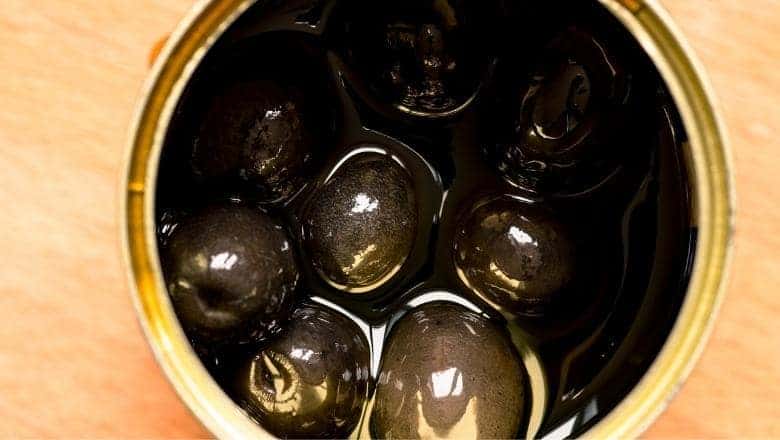Why Do Black Olives Come In Cans? Explained
Olive Knowledge is a part of Amazon Associates. As an Amazon Associate, we earn from qualifying purchases. Read our Affiliate Disclosure to learn more.
Have you ever wondered why black olives are almost always found in cans, unlike their green counterparts? Let’s delve into the intriguing process behind this pantry staple, revealing not just the ‘how’ but the fascinating ‘why’ of canned black olives.
Key Takeaways:
- Black olives turn black naturally as they ripen.
- Canned black olives are often artificially ripened green olives.
- They are canned due to quicker consumption compared to green olives.
- Canning black olives is cheaper than using glass jars.
- The canning process involves lye treatment and oxidation.
- Canned olives are cooked in the can for preservation.
- Glass jars are less suitable for canning due to airtightness and heat issues.
Why Are Some Olives Black In Color?

Haven’t we all pondered on this? Why are some olives black, and why are the others green? As has been said earlier, it depends on the species of olive and the region where it was grown.
Olives are naturally green, and as they ripen, they transition from green to purplish, then brown, and finally black. Thus, olives that are fully ripened will turn black naturally.
You may think that canned black olives are olives that were allowed to ripen and then harvested and canned for sale. This actually may not be true. Rather, they’re green olives through the process of lye treatment, and dilute brine helps to cause a natural phenolic, which eventually turns black due to oxidation.
In addition, Iron salt, Calcium chloride salts, and condensed air bubbled with the help of the curing vats, enabling green olives to become black.
Why Are Black Olives Sold In Cans?
Why cans? Why are they not sold in glass jars like the green ones? Here is what you should know:
Black olives are stored in cans because they are consumed almost immediately, unlike green olives, which can be kept for a longer time. This is because the black ones are riper, sweeter, and more preferably consumed, unlike the green ones, which are expected to be a crispy raw olive.
Black olives are mostly used in salads or eaten as a snack. Just like other canned foods, they need to be consumed once opened. This will enable it to stay fresh and fit for consumption.
Another reason why black olives come in cans is that they are cheaper. The cans are usually made of tin, which is easier to mass-produce, unlike glass jars. Some companies that are involved in the processing and packaging of black olives usually sell them in cans to save costs.
The Process of Canning The Olives

The process of artificial ripening and storage is quite easy to achieve. It involves the following steps:
- 1. Fresh green olives are plucked and placed in a lye solution. lye contains sodium and can be harmful to you. The great news is that the solution is diluted with water before the olives are placed. This is to ensure that they are still fit to be consumed.
- 2. After staying in the lye solution for about a day or two, they will be removed and rinsed out. By this time, the olives would have already turned black because of the presence of oxygen. Hence it is called oxidation.
- 3. The main purpose of using lye is because it allows the oxidation process to penetrate even down to the pits of the olive. This makes the olive edible.
- 4. Upon removal from the lye solution, they are added to a brine solution. The brine solution has ferrous gluconate added to it. This is to set the color and ensure the olives remain black in the can.
- 5. After this, the olives are then set for canning. Another portion of brine solution is added to it in the can to keep it fit for consumption.
- 6. The cans are airtight and will prevent any form of spoilage or bacterial growth on the olives. The olives are also cooked in the can for a certain period before they are finally put up for sale.
This process of canning cannot be done in a glass jar. One reason is that a glass jar may not be as airtight as a can. This can lead to spoilage and the wastage of the olives.
Also, the process of cooking the olives in a can may not be feasible in a glass jar. The glass will not be able to withstand the heat while being cooked and would consequently break.
Are Canned Black Olives Good For You?
Olive is a very nutritious snack that has amazing health benefits. You may be uncertain because it is stored in a can. Canned olives contain calories that are obtained from carbohydrates and fats.
For instance, a quarter cup of canned olives contains 39 calories; this can naturally add flavor to your diet without affecting your weight. Interestingly, the calories found in olives contain unsaturated fats, which invariably ameliorate the possibility of cholesterol in your bloodstream.
Olives also contain some natural carbs, carbs are nutrients contained in your food, and they convert into sugar when digested. These carbs are a natural energy booster to help you remain active in your day-to-day activities.
In addition, canned olives contain a minimum amount of protein, which can be equated to 0.3 grams per can. The great news is that they are very good for you and still offer you amazing benefits that are inexhaustible.
However, it is recommended that consumption is appropriate. This is because of the sodium content from the brine solution. Sodium will only cause issues for you if you are allergic or if you consume it in large quantities.
Similar Articles For You:
